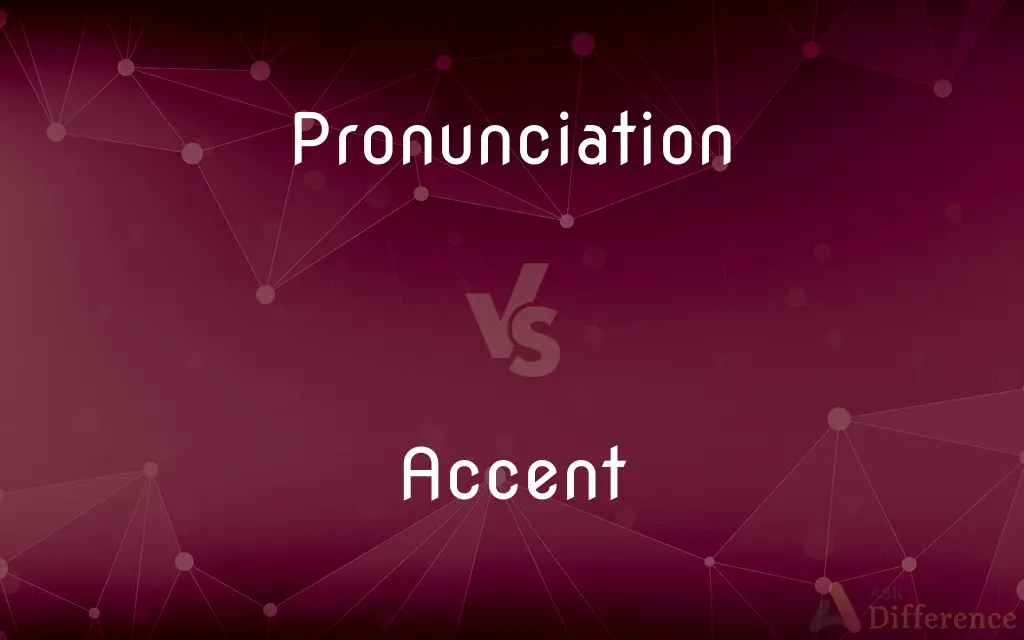Pronunciation vs. Accent — What's the Difference?
By Tayyaba Rehman — Updated on September 27, 2023
"Pronunciation is how words are spoken, using correct sounds. Accent is a distinctive way of pronouncing words, often linked to geography or social group."

Difference Between Pronunciation and Accent
Table of Contents
ADVERTISEMENT
Key Differences
Pronunciation and accent are integral aspects of language, especially when learning a new one. Pronunciation refers to the manner in which a word is spoken. It is about articulating the correct sounds and stresses to say a word accurately as per the dictions of the language. Proper pronunciation is crucial as incorrect articulation can lead to misunderstandings and communication barriers.
On the other hand, accent pertains to the distinctive way that groups of people pronounce words, influenced by geographic location, social groups, or native language. Accents can vary greatly even within the same language, manifesting differences in intonation, stress, rhythm, speed, and sometimes even word choice and grammar. An individual's accent can reveal information about their background, including their country of origin or the region they come from.
The key distinction between pronunciation and accent lies in their scope and application. While pronunciation is about the standard way of articulating words in a language, accent is about variations in that articulation. Incorrect pronunciation can hinder mutual understanding, but having a different accent does not typically impede communication as long as pronunciation is correct. People may have accents due to their native languages, regions, or communities, and they may carry them while speaking other languages.
Pronunciation is generally considered a part of learning a language and is essential for clear and correct communication. Accent, however, is more about identity and culture. It is something that is acquired naturally depending on one’s surroundings and background, and it is not considered incorrect or less important. Some may find a certain accent charming or difficult, but it is crucial to approach accents with an open and respectful mind, as they are a representation of diversity in language.
Accents enrich a language, making it more diverse and colorful, while proper pronunciation ensures clarity and understanding. Both play significant roles in the effectiveness and richness of communication, reflecting the diversity and cultural richness of the language speakers.
ADVERTISEMENT
Comparison Chart
Definition
Way words are spoken using correct sounds.
Distinctive way of pronouncing words.
Linked To
Language standard.
Geography, social group, or native language.
Impact
Affects clarity and understanding of words.
Reveals information about one’s background.
Variations
Correct or incorrect.
Numerous, related to different backgrounds.
Learning Aspect
Essential for clear and correct communication.
Acquired naturally, reflects identity and culture.
Compare with Definitions
Pronunciation
Method of pronouncing sounds in words.
Proper pronunciation ensures better understanding.
Accent
Specific way of pronunciation indicating origin.
People often guess her origin from her accent.
Pronunciation
Way a word is spoken in a language.
Her pronunciation is standard without any regional influence.
Accent
Characteristic pronunciation of a speech community.
His accent is a mix of several different regions.
Pronunciation
Proper way to articulate words in a language.
Improper pronunciation can lead to misunderstandings.
Accent
Way of articulation indicating speaker's background.
Her accent changed after living abroad for years.
Pronunciation
Articulating words correctly.
His pronunciation of words is very clear.
Accent
The relative prominence of a particular syllable of a word by greater intensity or by variation or modulation of pitch or tone.
Pronunciation
Correct articulation of sounds in words.
Good pronunciation is essential for effective communication.
Accent
Vocal prominence or emphasis given to a particular syllable, word, or phrase.
Pronunciation
Pronunciation is the way in which a word or a language is spoken. This may refer to generally agreed-upon sequences of sounds used in speaking a given word or language in a specific dialect ("correct pronunciation") or simply the way a particular individual speaks a word or language.
Accent
One determined by the regional or social background of the speaker.
Pronunciation
The way in which a word is pronounced
Similar pronunciations are heard in Ulster
Spelling does not determine pronunciation
Accent
One determined by the phonetic characteristics of the speaker's native language carried over to that speaker's use of another language.
Pronunciation
The act or manner of pronouncing words; utterance of speech.
Accent
A mark or symbol used in the printing and writing of certain languages to indicate the vocal quality to be given to a particular letter
An acute accent.
Pronunciation
A way of speaking a word, especially a way that is accepted or generally understood.
Accent
A mark or symbol used in printing and writing to indicate the stressed syllables of a spoken word.
Pronunciation
A graphic representation of the way a word is spoken, using phonetic symbols.
Accent
Rhythmically significant stress in a line of verse.
Pronunciation
(countable) The formal or informal way in which a word is made to sound when spoken.
What is the pronunciation of "hiccough"?
Accent
Emphasis or prominence given to a note or chord, as by an increase in volume or extended duration.
Pronunciation
(uncountable) The way in which the words of a language are made to sound when speaking.
His Italian pronunciation is terrible.
Accent
A mark representing this.
Pronunciation
(countable) The act of pronouncing or uttering a vocable.
Accent
A mark used as a superscript to distinguish among variables represented by the same symbol.
Pronunciation
The act of uttering with articulation; the act of giving the proper sound and accent; utterance; as, the pronunciation of syllables of words; distinct or indistinct pronunciation.
Accent
A mark used as a superscript to indicate the first derivative of a variable.
Pronunciation
The mode of uttering words or sentences.
Accent
A mark or one of several marks used as a superscript to indicate a unit, such as feet (′) and inches (") in linear measurement.
Pronunciation
The art of manner of uttering a discourse publicly with propriety and gracefulness; - now called delivery.
Accent
A distinctive feature or quality, such as a feature that accentuates, contrasts with, or complements a decorative style.
Pronunciation
The manner in which someone utters a word;
They are always correcting my pronunciation
Accent
Something that accentuates or contrasts something else, as a touch of color that makes the features of an image stand out.
Pronunciation
The way a word or a language is customarily spoken;
The pronunciation of Chinese is difficult for foreigners
That is the correct pronunciation
Accent
Particular importance or interest; emphasis
The accent is on comfort.
Accent
To stress or emphasize the pronunciation of
Accented the first syllable in “debacle.”.
Accent
To mark with a printed accent.
Accent
To focus attention on; accentuate
A program that accents leadership development.
Accent
(linguistics) A higher-pitched or stronger (louder or longer) articulation of a particular syllable of a word or phrase in order to distinguish it from the others or to emphasize it.
In the word "careful", the accent is placed on the first syllable.
Accent
(figuratively) Emphasis or importance in general.
At this hotel, the accent is on luxury.
Accent
(orthography) A mark or character used in writing, in order to indicate the place of the spoken accent, or to indicate the nature or quality of the vowel marked.
The name Cézanne is written with an acute accent.
Accent
Modulation of the voice in speaking; the manner of speaking or pronouncing; a peculiar or characteristic modification of the voice, expressing emotion; tone.
Accent
The distinctive manner of pronouncing a language associated with a particular region, social group, etc., whether of a native speaker or a foreign speaker; the phonetic and phonological aspects of a dialect.
A foreign accent
A broad Irish accent
A hint of a German accent
Accent
A manner of pronunciation suggesting that the speaker is from a different region; a foreign accent.
My professor's accent is so thick that it's difficult to understand her lectures.
She spoke with a strong accent that betrayed her southern roots.
I was surprised to learn that he was an immigrant, as he spoke without any accent.
Accent
(sign languages) A distinctive manner of producing a sign language, such as someone who does not normally use a certain sign language might have when using it.
Accent
A word; a significant tone or sound.
Accent
Expressions in general; speech.
Accent
Stress laid on certain syllables of a verse.
Accent
(music) A regularly recurring stress upon the tone to mark the beginning, and, more feebly, the third part of the measure.
Accent
(music) A special emphasis of a tone, even in the weaker part of the measure.
Accent
(music) A mark used to represent this special emphasis.The third and fourth symbols are accents (marks used to represent special emphasis in music).
Accent
(music) The rhythmical accent, which marks phrases and sections of a period.
Accent
(mathematics) A prime symbol.
Accent
Emphasis laid on a part of an artistic design or composition; an emphasized detail, in particular a detail in sharp contrast to its surroundings.
Accent color
Accent
A very small gemstone set into a piece of jewellery.
Accent
(archaic) Utterance.
Accent
(transitive) To express the accent of vocally; to utter with accent.
Accent
(transitive) To mark emphatically; to emphasize; to accentuate; to make prominent.
Accent
(transitive) To mark with written accents.
Accent
A superior force of voice or of articulative effort upon some particular syllable of a word or a phrase, distinguishing it from the others.
Accent
A mark or character used in writing, and serving to regulate the pronunciation; esp.: (a) a mark to indicate the nature and place of the spoken accent; (b) a mark to indicate the quality of sound of the vowel marked; as, the French accents.
Accent
Modulation of the voice in speaking; manner of speaking or pronouncing; peculiar or characteristic modification of the voice; tone; as, a foreign accent; a French or a German accent.
The tender accent of a woman's cry.
Accent
A word; a significant tone
Winds! on your wings to Heaven her accents bear,Such words as Heaven alone is fit to hear.
Accent
Stress laid on certain syllables of a verse.
Accent
A regularly recurring stress upon the tone to mark the beginning, and, more feebly, the third part of the measure.
Accent
A mark placed at the right hand of a letter, and a little above it, to distinguish magnitudes of a similar kind expressed by the same letter, but differing in value, as y´, y.
Accent
To express the accent of (either by the voice or by a mark); to utter or to mark with accent.
Accent
To mark emphatically; to emphasize.
Accent
Distinctive manner of oral expression;
He couldn't suppress his contemptuous accent
She had a very clear speech pattern
Accent
Special importance or significance;
The red light gave the central figure increased emphasis
The room was decorated in shades of gray with distinctive red accents
Accent
The usage or vocabulary that is characteristic of a specific group of people;
The immigrants spoke an odd dialect of English
He has a strong German accent
Accent
The relative prominence of a syllable or musical note (especially with regard to stress or pitch);
He put the stress on the wrong syllable
Accent
A diacritical mark used to indicate stress or placed above a vowel to indicate a special pronunciation
Accent
To stress, single out as important;
Dr. Jones emphasizes exercise in addition to a change in diet
Accent
Put stress on; utter with an accent;
In Farsi, you accent the last syllable of each word
Accent
Distinctive manner of pronouncing words.
His accent reveals that he is not a native speaker.
Accent
Unique pronunciation style related to region or group.
Regional accents add diversity to a language.
Common Curiosities
Is having an Accent incorrect?
No, having an accent is not incorrect; it's a natural aspect of spoken language reflecting one’s background.
What is Pronunciation?
Pronunciation is the way words are spoken using the correct sounds and stress as per language norms.
Can incorrect Pronunciation hinder communication?
Yes, incorrect pronunciation can lead to misunderstandings and hinder effective communication.
Can people have multiple Accents?
Yes, people exposed to various linguistic environments may develop a hybrid or changing accent.
Is Accent linked to identity?
Absolutely, accents are often linked to cultural identity and background and can be a source of pride.
What is Accent?
Accent is a distinctive way of pronouncing words, often influenced by geography, social group, or native language.
Is Pronunciation crucial for learning a new language?
Absolutely, proper pronunciation is fundamental for learning any language to ensure clear and correct communication.
Can Accent reveal information about a person?
Yes, accent can often reveal information about a person’s geographical origin, social group, or native language.
Can one have an Accent in their native language?
Yes, accents can be present in native languages, often indicating regional or social variations.
Is there a standard Pronunciation for words in English?
Yes, dictionaries often provide standard pronunciations, but accents can bring variations in sound articulation.
Can Pronunciation be improved with practice?
Yes, consistent practice, listening, and speaking can significantly improve pronunciation.
Does good Pronunciation eliminate Accent?
No, proper pronunciation does not eliminate accent; one can speak clearly and correctly while having an accent.
Can Pronunciation vary within the same language?
Generally, pronunciation of words is standard in a language, but accents can influence how sounds are articulated.
Can Accent be changed or modified?
Yes, exposure to different linguistic environments can influence and modify one’s accent over time.
Is the diversity in Accent beneficial to a language?
Yes, accent diversity enriches a language, reflecting the cultural and geographical diversity of its speakers.
Share Your Discovery

Previous Comparison
Hill vs. Knoll
Next Comparison
Cossack vs. KazakhAuthor Spotlight
Written by
Tayyaba RehmanTayyaba Rehman is a distinguished writer, currently serving as a primary contributor to askdifference.com. As a researcher in semantics and etymology, Tayyaba's passion for the complexity of languages and their distinctions has found a perfect home on the platform. Tayyaba delves into the intricacies of language, distinguishing between commonly confused words and phrases, thereby providing clarity for readers worldwide.
















































